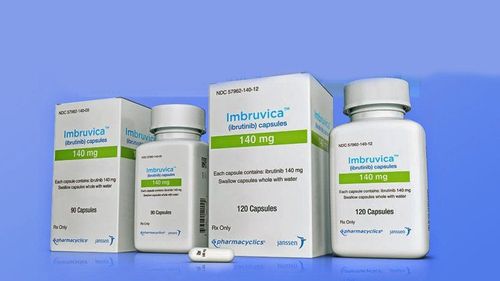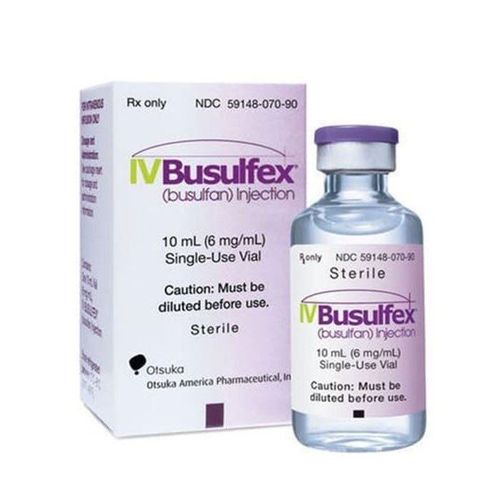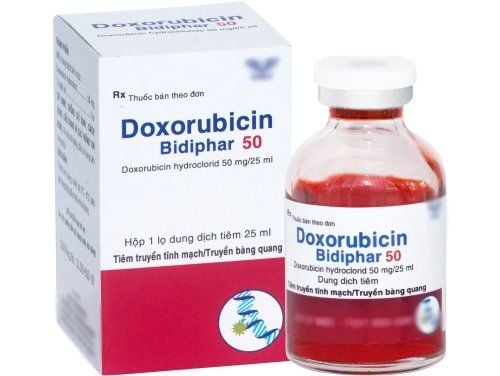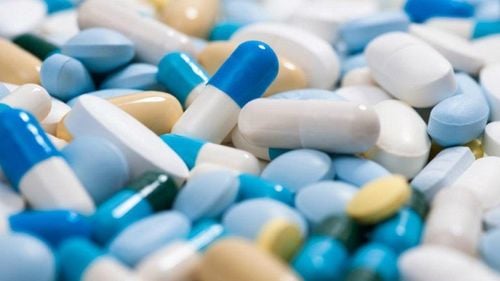This is an automatically translated article.
Tepadina is used to treat cancer. Medicines that slow or stop the growth of cancer cells. This drug is often given into the bladder to treat bladder cancer, and is also used with other drugs to prevent rejection of a stem cell transplant.1. Indications and contraindications of the drug Tepadina
Tepadina is indicated in the following cases:Cancer or malignancy Pre-transplant conditioning of allogeneic hematopoietic stem cells Pre-conditioning of autologous stem cells Fluid accumulation in the abdominal cavity due to Breast cancer Ovarian cancer Bladder cancer Fluid in the heart capsule caused by malignancy Presence of malignant fluid in the pleural space Tepadina is contraindicated in the following cases:
Infection Severe Decreased bone marrow function Anemia Increased risk of bleeding Decreased blood platelets Low white blood cell count Liver disease Pregnancy Breastfeeding women Chronic kidney disease stage 4, 5

Thuốc Tepadina được sử dụng để điều trị ung thư
2. How to use Tepadina
Tepadina is injected into your vein by a healthcare professional. Sometimes, Tepadina is injected directly into the tumor. Tell your doctor or nurse right away if you experience pain, burning, or redness at the injection site.To treat bladder cancer, Tepadina is usually inserted into the bladder through a catheter. Your doctor may direct you to limit fluid use for 8 to 12 hours before taking the medication. The solution is usually left in place for 2 hours and then drained out through a bladder catheter. Your doctor may instruct you to change positions every 15 minutes while the solution is in your bladder to ensure that the treatment solution is in contact with all areas of your bladder.
If you are taking Tepadina to prevent stem cell rejection, you should be given 2 doses of this medicine 12 hours apart. During treatment, skin problems may occur. To reduce the risk of skin problems, shower with water and change the dressing at least twice a day until 48 hours after stopping treatment. Also, change bed sheets daily during treatment.
Dosage and frequency of use of Tepadina is calculated based on your medical condition and response to treatment. Your doctor will do blood tests (complete blood count) to find out the right dose for you. Your next dose may need to be rescheduled if your white blood cell or platelet count is too low.
Avoid getting Tepadina in your eyes or on your skin. If medication gets in eyes, rinse affected eye(s) thoroughly with water and contact your doctor. If Tepadina gets on your skin, wash the area thoroughly with soap and water.
Laboratory tests and/or medical tests (eg, complete blood count, kidney tests, liver tests) should be done while you are being treated with Tepadina and for several weeks after your last dose to monitor your progress or check for side effects.

Hãy báo cho bác sĩ hoặc y tá của bạn ngay lập tức nếu bạn cảm thấy đau, rát hoặc đỏ ở chỗ tiêm thuốc Tepadina
3. Side effects of the drug Tepadina
While using Tepadina, you may experience pain or redness at the injection site, dizziness, headache, blurred vision, fever, nausea, vomiting, stomach or abdominal pain, or loss of appetite.Dietary changes such as eating small meals or limiting activity may help alleviate some of these effects. In some cases, drug treatment may be needed to prevent or reduce nausea and vomiting. If any of these Tepadina side effects persist or get worse, tell your doctor right away.
Temporary hair loss is another common side effect of Tepadina. You don't need to worry, the hair will grow back after the treatment is over.
People using Tepadina may have serious side effects. However, your doctor has prescribed you this medicine because he or she has judged that the benefit to you is greater than the risk of side effects. Careful monitoring by your doctor can reduce your risk of side effects.
Painful sores may appear on the lips, mouth and throat. To reduce your risk, limit hot foods and drinks, brush your teeth carefully, avoid using mouthwashes that contain alcohol, and rinse your mouth often with cool water.
Tepadina can also cause very serious bleeding. Tell your doctor right away if any of these signs of serious bleeding occur after using Tepadina, including: Bloody or black/tarry stools, coughing up blood, frequent nosebleeds frequent or difficult to stop, dizziness or fainting, fast/irregular heartbeat, pale/gray/blue skin, vomit that is bloody or looks like coffee grounds.
Tell your doctor right away if you have any serious side effects of Tepadina, including: Severe stomach or stomach pain, back/side pain, painful or difficult urination , pink/dark urine
If you are using Tepadina to prevent transplant rejection, tell your doctor right away if you have any serious side effects, including: signs of skin problems (such as changes in skin color, peeling skin/blisters), signs of liver problems (such as nausea/vomiting that won't stop, loss of appetite, stomach or abdominal pain, yellowing of the eyes or skin), mental changes (such as confusion, hallucinations, behavior changes).
Tepadina may affect sperm production, an effect that may decrease male fertility.
A very serious allergic reaction to Tepadina is very rare. However, if you notice any of these symptoms of a serious allergic reaction to Tepadina, including: rash, itching or swelling (especially of the face, tongue or throat), severe dizziness, difficulty breathing, get medical help right away.

Trongng quá trình sử dụng thuốc Tepadina, bạn có thể bị nhức đầu, mờ mắt, sốt...
Common side effects of Tepadina include:
Cytomegalovirus infection Infection Anemia Anemia Low blood platelets Low white blood cell level Low neutrophil level Bleeding stomatitis Bilirubin in the blood High Abnormal liver function tests Bloody urine Diarrhea Uncommon side effects of Tepadina include:
Decreased ability of the body to fight infections Bleeding in the skull High uric acid levels in the blood Reaction at the injection site Blurred vision Pink eyes Low sperm count No menstrual period Dermatitis Itching Hair loss Skin color changes Dizziness Fever Low energy Decreased appetite Headache Nausea Unrelenting weakness Body weakness Severe abdominal pain Rare side effects of Tepadina include:
Leukemia Suicidal thoughts Encephalopathy Vision loss Pulmonary arterial hypertension Pericarditis Pericardial fluid Slow heart rate Chronic heart failure calculation Subdural Intracranial Hemorrhage Stroke Hepatic Venous Obstruction Swelling of the vocal cords Enteritis Renal failure Cystitis Cystitis with hemorrhage Toxic epidermal necrolysis Stevens-Johnson syndrome Blistering skin Coma Convulsions Wheezing Difficulty breathing Enlarged liver Ascites Anaphylactic shock Lymphatic tissue disorder Post-transplant Malignant Lymphoma Confusion Anxiety Behavioral problems Upper eyelid drooping Asthma Gastritis Abnormal skin peeling Drowsiness Delirium Amnesia Unusual way of walking Difficulty swallowing Irritability Lethargy Behavior Slowness of movement This is not a complete list of Tepadina's possible side effects. If you notice other side effects of Tepadina medicine not listed above, contact your doctor right away.
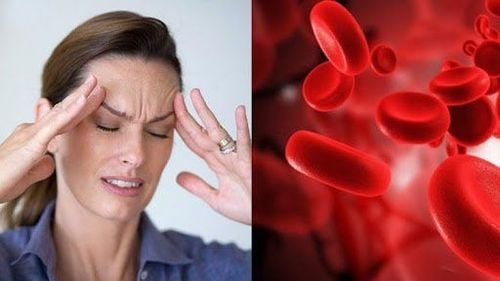
Thiếu máu là một trong các tác dụng phụ thường gặp của thuốc Tepadina
4. Measures to prevent side effects of the drug Tepadina
Before using Tepadina, tell your doctor if you are allergic to this medicine and any other allergies, if any. Tepadina products may contain ineffective ingredients that may cause allergic reactions or other problems.Before using Tepadina, tell your doctor your medical history, especially of: Bone marrow problems (such as low white blood cell or platelet counts from previous chemotherapy/radiation treatment) , kidney disease, liver disease.
Tepadina may make you more susceptible to infections or may worsen any infections you already have. Avoid contact with people who have an infection that can spread to others (such as chickenpox, measles, flu).
Do not have any vaccinations/vaccinations during treatment with Tepadina, without your doctor's consent. Also, you need to avoid contact with people who have recently received a live attenuated vaccine (such as the nasal flu vaccine).
Before surgery, tell your doctor or dentist that you are being treated with Tepadina.
Tell your doctor if you are pregnant or plan to become pregnant. You should not become pregnant while using Tepadina, it could harm an unborn baby. Women should ask about reliable forms of birth control while using Tepadina and for 6 months after stopping treatment. Women should also take a pregnancy test before starting treatment.
Men should ask about reliable forms of birth control while using Tepadina and for 1 year after stopping treatment. If you or your partner becomes pregnant while using Tepadina, talk to your doctor right away about the risks and benefits of this medicine.
It is not known whether Tepadina passes into breast milk. Due to the possible risk to the infant, breast-feeding while using Tepadina is not recommended.

Trước khi sử dụng Tepadina, hãy cho bác sĩ biết nếu bạn bị dị ứng với loại thuốc này và bất kỳ dị ứng nào khác nếu có
5. Interactions of Tepadina
Drug interactions can change the way Tepadina works or increase your risk of serious side effects. Tell your doctor about all the prescription drugs, over-the-counter medicines, and herbal products you use. Do not start, stop, or change the dose of any medicine while being treated with Tepadina, without your doctor's approval.Some products that may interact with Tepadina include: Aspirin and other NSAIDs (e.g. Ibuprofen), drugs that can harm the immune system (including chemotherapy, corticosteroids such as prednisone), vaccines live attenuated virus (eg, oral polio vaccine, nasal flu vaccine), nalidixic acid.
Low-dose aspirin should be continued if prescribed by your doctor to prevent a heart attack or stroke (usually at doses of 81-325 milligrams a day).
6. What to do if you overdose or forget to take Tepadina?
If you or someone else has overdosed on Tepadina and has severe symptoms such as fainting or difficulty breathing, call 911 right away.To get the best possible benefit, it is important to receive each dose of Tepadina according to the schedule that has been directed. If you miss a dose of Tepadina, contact your doctor to set up a new dosing schedule.
Please dial HOTLINE for more information or register for an appointment HERE. Download MyVinmec app to make appointments faster and to manage your bookings easily.
Reference source: webmd.com



